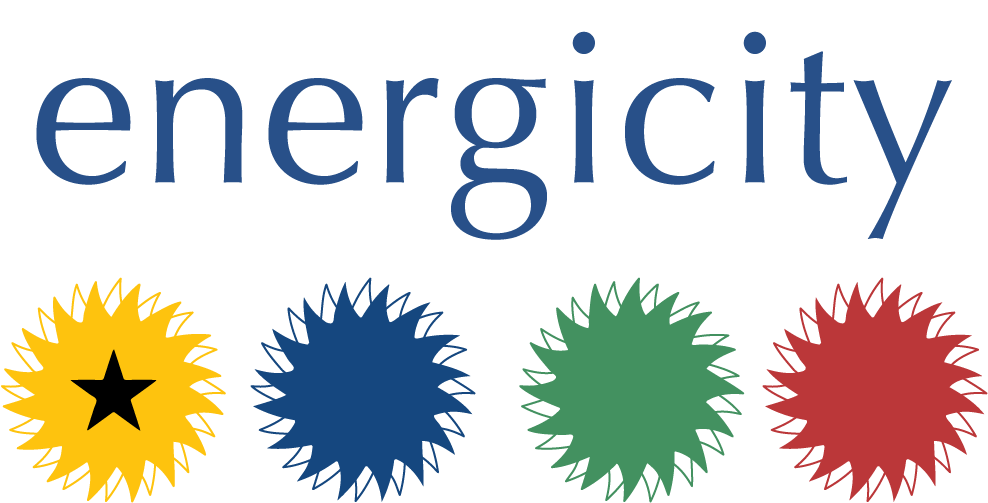
Picture in middle: Honourable Alieu Bash Kamara Member of Parliament (far right) speaking about the benefits of the electrification program Minister of Energy of Sierra Leone Alhaji Kanja Sesay (far left), and Nicholas Gardner Country Director UNOPS.
Picture on right: First celebration dinner with electric lights in Foredugu in 60 years… powered entirely by solar.
West African mini grid utility operator Energicity’s Sierra Leonean subsidiary, Power Leone, has turned on the lights for Foredugu in the Karene District of Sierra Leone.
Located between Lunsar-Makeni Highway, Port Loko District, Sierra Leone, Foredugu is home to more than 400 people. The community was without power for over 60 years due to the fact that the National grid could not reach the community. Power Leone has deployed a mini grid with 40 KW of solar to serve the community. This Foredugu project is the first project launched as part of Phase Two of the Rural Renewable Energy Project. Rural Renewable Energy Project (RREP) is funded by @FCDOGovUK and implemented by @UNOPS_SL on behalf of the Ministry of Energy of Sierra Leone. Upon completion of the project in May 2022 the #RREP will be one of the largest off-grid distributed mini-grid projects in Africa with a total of 99 mini-grids across Sierra Leone.
In the Phase One of the RREP, Power Leone has commissioned and is operating 21 minigrids ranging from 16 kw to 36kw, totaling 630kw in capacity and serving a total of 30,000 people. By completion of Phase 2 – the combined Phase 1 and Phase 2, Power Leone will serve approximately 70,000- 100,000 Sierra Leoneans with reliable, sustainable solar powered electricity.
Speaking at the commissioning of the electricity on 27 February 2021, Hon. Alhaji Kanja Sesay, Minister of Energy, described electrification as a human right saying “light is right and every Sierra Leoneans should have access to electricity.” He added that the provision of electricity at Foredugu and other sites is strategic as light is bringing economic development and improves the livelihood of people living in rural areas.
During the event, Ing. Nick Gardner, UNOPS Country Manager, expressed how delighted he was to see Foredugu as the first of 45 mini grid communities in phase two of RREP to be commissioned. He noted that the project is impactful and he looks forward to seeing the positive socio economic impact that the electricity will have in Foredugu and other sites which will be electrified subsequently. He said, “These communities are spread across 13 districts within the country and they are bigger communities with bigger generation assets (power plants).”
With the completion of this project, Joe Philip, V.P. of Engineering & Operations and co-founder Energicity Corp said of the construction and technology for the mini grids. “Energicity built this project to empower Sierra Leoneans with electricity but also jobs -with all of the construction being done in country. The Powerhouse construction was led by the mason, Ibrahim B. KANU from Foredugu, and our racking was built at the Government Technical Institute in Freetown. Our meters were assembled with partners Barefoot Women’s Solar Engineering. Through our partnerships with Sierra Leonean entrepreneurs, artisans and NGOs, we meet our threefold commitment – quality mini grid installations; cost effective, reliable solar powered electricity, and Sierra Leonean economic empowerment.”
With electricity provided by mini grids, education improves as children will be able to study at night and complete night classes. Electricity also improves health care, which gives the villages access to ultrasounds and vaccine refrigerators. Additionally, more businesses will be able to develop and expand, which will power economic development.
Madam Yabom Posseh Kanu is just one of many women whose businesses and lives will be improved by electricity. Solar will decrease the amount of money directed towards the purchase of fuel, which can be located outside the local community, and at exorbitant prices. On average, about 5 gallons of fuel are used per day. Additionally, security has been a challenge because the area is dark, causing produce and tools to be stolen. Now, lights will provide a safer area in the community.
QUOTE “The desire to grow my business, to build economic viability, to thrive, and to contribute to my community can now be achieved. Electricity will allow me to expand the rice milling business, which means the farming process becomes more efficient and the milling machines will operate at ease.”

Leave a comment